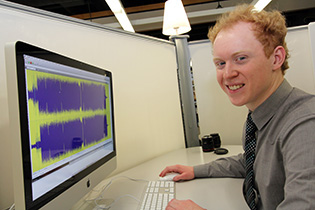He’s a trailblazer of sorts, cobbling together classes just as he would sounds on his computer keyboard. After editing and review, Luke Walker ’15 is Wabash College’s first-ever electronic music minor.
Walker understands how his hard work, developing interests, and a supportive environment combined to give him this unique experience. Not only has the Wingate, IN, native created his own minor and studied abroad, but he’s come as far as any Wally ever has in the electronic music genre. Not bad for a kid who grew up 12 miles from campus.
“Wabash has served me well,” Walker said. “The promises have held up. I’ve studied abroad, created a minor, and that’s not bad. You can’t do things like this everywhere.”
Wabash showed Walker that electronic music is as much linked to art as to the composition of sounds. Professor Peter Hulen taught him that in an Introduction to Electronic Music class two years ago.
“It was very interesting, but not exactly what I knew as electronic music,” Walker recalled. “A lot of people go into it thinking, ‘oh, I’m going to be making all of these club hits,’ then you learn the ropes and realize that this is more about art. This isn’t about making these really catchy tunes you listen to.”
 The artistic side – the practice of finding and connecting the sounds – appealed to the French major and computer science minor. It moved him from curious to serious.
The artistic side – the practice of finding and connecting the sounds – appealed to the French major and computer science minor. It moved him from curious to serious.
“I appreciate the process more because of the experience,” he said. “It opens you up to more forms of art. I don’t consider myself a composer. I feel like there are fewer rules when it comes to electronic music. You just have to let it go, appreciate it, and take it in stride.”
Walker has taken every electronic music class available: history, theory, composition, and performance. All that was left was an independent study to cover the ensemble requirement and approval from the Academic Policy Committee. With the support of Hulen, Walker’s advisors, economics professor Christie Byun and mathematics professor Will Turner, and professors from computer science, that approval came through.
“Luke is a bright, thoughtful, and persistent student with a natural bent for the creative aesthetics and technical interests that apply to electronic music,” said Hulen, associate professor of music. “He is also a serious enough student that his computer science professor and his advisors were willing to get behind the minor proposal.”
Electronic music first hit Wabash four decades ago, dating back to a University of Illinois Experimental Music Studio performance in 1970, and the College has enjoyed a dedicated electronic music studio in the Fine Arts Center for 20 years. The minor continues to develop as new courses are offered and new equipment and technologies added to support the pursuit.
Walker takes pride in his place in the Wabash electronic music community. From his position, he also sees interest building.
“I like being in on the ground floor of getting the community to appreciate electronic music,” he said. “I know that there are other students out there that would like to do it.”
Two of Walker’s compositions, “Z” and “(s)ombre” were featured at “Soundscapes,” the College’s first-ever electronic music concert in Salter Hall on Feb. 11. Looking back, Walker is well aware that his interests allowed him to self-direct his academic pursuits.
“It’s about discovering the interest,” Walker concluded. “It’s something that develops over time as you take these courses and do these things. I finally got electronic music on my transcript and I’m proud of that. I think it’s a really neat thing to be the first one.”